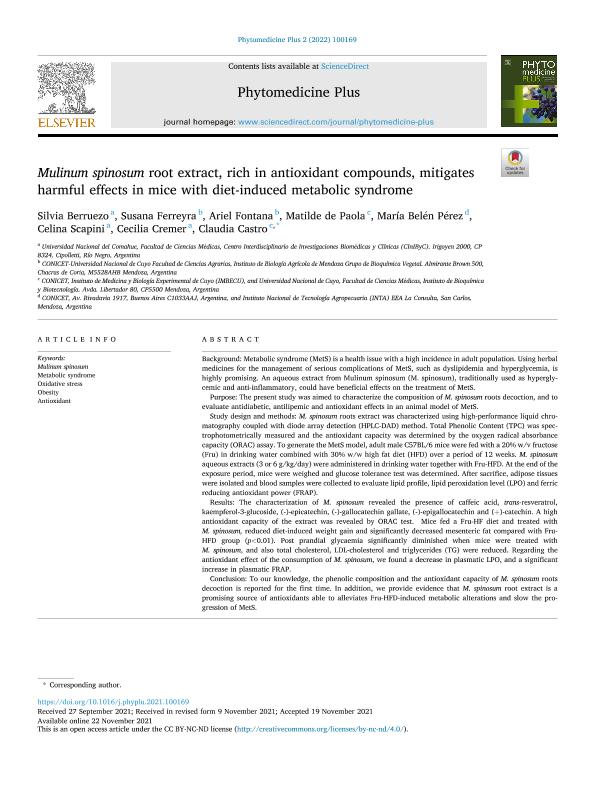Artículo
Mulinum spinosum root extract, rich in antioxidant compounds, mitigates harmful effects in mice with diet-induced metabolic syndrome
Berruezo Puebla, Silvia Beatriz; Ferreyra, Susana Gisela ; Fontana, Ariel Ramón
; Fontana, Ariel Ramón ; de Paola, Maria Matilde
; de Paola, Maria Matilde ; Pérez, María Belén
; Pérez, María Belén ; Scapini, Celina Margarita; Cremer, Maria Cecilia; Castro, Claudia Magdalena
; Scapini, Celina Margarita; Cremer, Maria Cecilia; Castro, Claudia Magdalena
 ; Fontana, Ariel Ramón
; Fontana, Ariel Ramón ; de Paola, Maria Matilde
; de Paola, Maria Matilde ; Pérez, María Belén
; Pérez, María Belén ; Scapini, Celina Margarita; Cremer, Maria Cecilia; Castro, Claudia Magdalena
; Scapini, Celina Margarita; Cremer, Maria Cecilia; Castro, Claudia Magdalena
Fecha de publicación:
02/2022
Editorial:
Elsevier
Revista:
Phytomedicine Plus
ISSN:
2667-0313
Idioma:
Inglés
Tipo de recurso:
Artículo publicado
Clasificación temática:
Resumen
Background: Metabolic syndrome (MetS) is a health issue with a high incidence in adult population. Using herbal medicines for the management of serious complications of MetS, such as dyslipidemia and hyperglycemia, is highly promising. An aqueous extract from Mulinum spinosum (M. spinosum), traditionally used as hyperglycemic and anti-inflammatory, could have beneficial effects on the treatment of MetS. Purpose: The present study was aimed to characterize the composition of M. spinosum roots decoction, and to evaluate antidiabetic, antilipemic and antioxidant effects in an animal model of MetS. Study design and methods: M. spinosum roots extract was characterized using high-performance liquid chromatography coupled with diode array detection (HPLC-DAD) method. Total Phenolic Content (TPC) was spectrophotometrically measured and the antioxidant capacity was determined by the oxygen radical absorbance capacity (ORAC) assay. To generate the MetS model, adult male C57BL/6 mice were fed with a 20% w/v fructose (Fru) in drinking water combined with 30% w/w high fat diet (HFD) over a period of 12 weeks. M. spinosum aqueous extracts (3 or 6 g/kg/day) were administered in drinking water together with Fru-HFD. At the end of the exposure period, mice were weighed and glucose tolerance test was determined. After sacrifice, adipose tissues were isolated and blood samples were collected to evaluate lipid profile, lipid peroxidation level (LPO) and ferric reducing antioxidant power (FRAP). Results: The characterization of M. spinosum revealed the presence of caffeic acid, trans-resveratrol, kaempferol-3-glucoside, (-)-epicatechin, (-)-gallocatechin gallate, (-)-epigallocatechin and (+)-catechin. A high antioxidant capacity of the extract was revealed by ORAC test. Mice fed a Fru-HF diet and treated with M. spinosum, reduced diet-induced weight gain and significantly decreased mesenteric fat compared with Fru-HFD group (p<0.01). Post prandial glycaemia significantly diminished when mice were treated with M. spinosum, and also total cholesterol, LDL-cholesterol and triglycerides (TG) were reduced. Regarding the antioxidant effect of the consumption of M. spinosum, we found a decrease in plasmatic LPO, and a significant increase in plasmatic FRAP. Conclusion: To our knowledge, the phenolic composition and the antioxidant capacity of M. spinosum roots decoction is reported for the first time. In addition, we provide evidence that M. spinosum root extract is a promising source of antioxidants able to alleviates Fru-HFD-induced metabolic alterations and slow the progression of MetS.
Palabras clave:
ANTIOXIDANT
,
METABOLIC SYNDROME
,
MULINUM SPINOSUM
,
OBESITY
,
OXIDATIVE STRESS
Archivos asociados
Licencia
Identificadores
Colecciones
Articulos(CCT - MENDOZA)
Articulos de CTRO.CIENTIFICO TECNOL.CONICET - MENDOZA
Articulos de CTRO.CIENTIFICO TECNOL.CONICET - MENDOZA
Articulos(IBAM)
Articulos de INST.DE BIOLOGIA AGRICOLA DE MENDOZA
Articulos de INST.DE BIOLOGIA AGRICOLA DE MENDOZA
Articulos(IMBECU)
Articulos de INST. DE MEDICINA Y BIO. EXP. DE CUYO
Articulos de INST. DE MEDICINA Y BIO. EXP. DE CUYO
Citación
Berruezo Puebla, Silvia Beatriz; Ferreyra, Susana Gisela; Fontana, Ariel Ramón; de Paola, Maria Matilde; Pérez, María Belén; et al.; Mulinum spinosum root extract, rich in antioxidant compounds, mitigates harmful effects in mice with diet-induced metabolic syndrome; Elsevier; Phytomedicine Plus; 2; 1; 2-2022; 1-8
Compartir
Altmétricas



